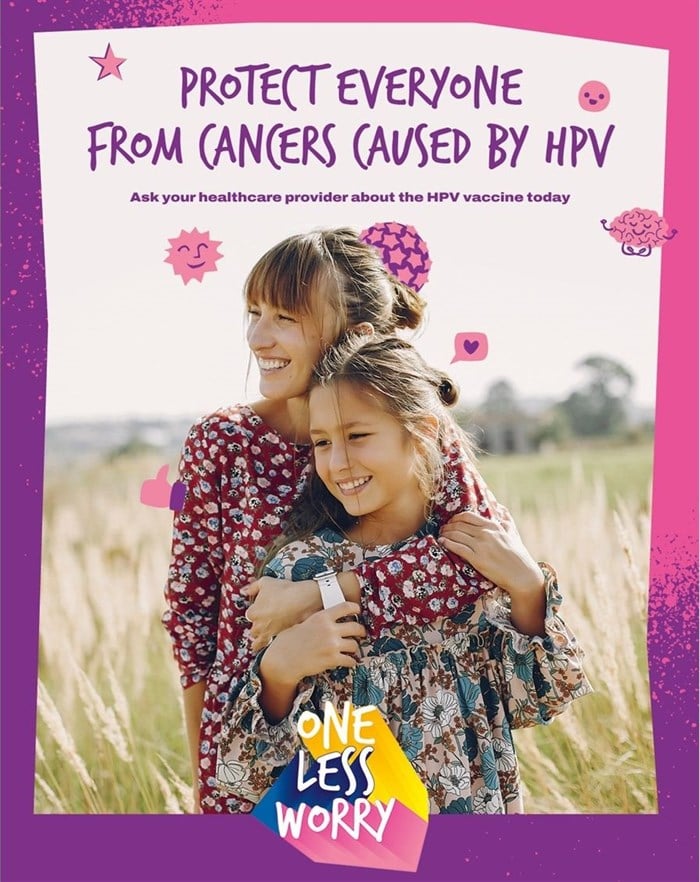
Top stories






More news


Marketing & Media
Ads are coming to AI. Does that really have to be such a bad thing?














The #OneLessWorry HPV campaign aims to increase public awareness and understanding of the HPV virus and to promote the importance of the lowering of risk through HPV vaccinations, regular screenings, namely Pap smears, and diagnosis and treatment of papillomavirus-related disease.
#OneLessWorry #HPV #CANSACervicalAwareness #EliminateCervicalCancer
Cansa’s national manager for Health Promotion, Lorraine Govender, says that “Cansa is committed to working with partners like the IPVS to educate the public about HPV and its link to cancers such as cervical cancer. In 2021, we launched our two-year Cervical Cancer Awareness and Support Campaign on International HPV Day, where we highlighted that contracting certain HPV strains may result in cervical cancer as well as risk factors and symptoms of cervical cancer and the importance of early detection through screening. It is also important to know that certain HPV strains can cause some head and neck cancers, cancers of the penis and anus, but most cervical cancers are a direct result of HPV infection.”
... cervical cancer is the second most common cancer
among women in South Africa
and the cancer with the highest mortality rate.
According to the National Cancer Registry (2019), cervical cancer is the second most common cancer among women in South Africa and the cancer with the highest mortality rate.
About seven in every 10 people will have HPV infection at some point in their lifetime. It is difficult to avoid as many people who contract it are not aware that they have it as they do not show any symptoms or health problems. Many of the strains are not as harmful as strains 16 and 18 which are detected in most cervical cancers. The virus lives on your skin and can be transmitted through skin-to-skin or sexual contact.
The most effective way to lower risk for HPV is to be vaccinated against it. HPV vaccination can prevent 90% of cervical and anal cancers and most other cancers caused by HPV.*
A study carried out by Cancer Research UK showed that young women, now in their early twenties, who had the vaccine at a young age presented with a reduction in both pre-cancerous growths and an 87% reduction in cervical cancer. The results were not as significant in teens who were vaccinated at an older age and those who had already been sexually active.**
Govender adds, “Cansa encourages young women to get vaccinated against HPV and hopes that parents and guardians will consent to this as it is key to protecting our youth against potentially life-threatening disease. We encourage our teens who are planning their future to ensure HPV vaccination becomes part of their plan.”
Cansa also supports the Department of Health’s HPV School Vaccination Programme to help reduce cervical cancer risk. Adolescent girls attending public schools between the ages of 9 and 14 years have access to the HPV vaccine. As of 2020, the proportion of adolescent girls aged 15 years who had received at least one dose of the HPV vaccine at any time between ages 9 and 14 years was 75%, while 61% had completed the full recommended two-dose schedule. We need to empower our adolescent girls to demand life-saving HPV vaccines.
Other preventative measures include women, who are sexually active, prioritising their health and going for regular Pap smear screening tests. Early detection is key to fighting cervical cancer as it is treatable if caught in the early stages.
Using protection such as condoms, consistently, can reduce one’s chance of contracting HPV. It will, however, not eliminate it completely. Limiting one’s sexual partners can also help reduce your risk.

As part of Cansa’s cancer screening services, Pap smears (for cervical cancer screenings) are available at most Cansa Care Centres across South Africa for a fee of R380 – which includes a clinical breast screening and the laboratory fees. Should any abnormalities be detected, Cansa can help with a referral within the public health care sector or to a medical practitioner.
Cansa, in association with the Centre of Community Technology at Nelson Mandela University, created an HPV awareness video to help spread the message of the efficacy of HPV vaccinations and screening to promote early detection. Further educational tools include a cervical cancer awareness video promoting the importance of Pap smears and educational radio spots in partnership with Siemens Healthineers. Resources are available in a variety of languages to ensure that a diverse group of women can be reached.
The National Department of Health’s Cervical Cancer Prevention and Control Policy states that women aged 30 years and older should have three Pap smears in their lifetime at ages 30, 40 and 50 which are provided at some public health clinics at no cost (non-symptomatic). If women experience abnormal symptoms, they can request a Pap smear at public health clinics. HIV positive women are eligible for a Pap smear at diagnosis and every three years thereafter if negative for cervical cancer (yearly if screening is positive).
If you, or a loved one, have been diagnosed with cervical cancer, contact your local Cansa Care Centre to access Cansa’s care and support programmes such as medical equipment hire, wigs, counselling, Tele Counselling, support groups, online support groups and resources, as well as Cansa Care Homes where patients receiving treatment far from home can stay during treatment. Support and information can also be obtained via the Cansa Help Desk on 0800 22 6622 or info@cansa.org.za.
For more information, please contact Lorraine Govender, national manager: Health Promotion at email az.gro.asnac@rednevogl or call 031 205 9525 or 084 240 2488.
* https://www.askabouthpv.org/hpv-facts/information-for-everyone
** https://www.thelancet.com/journals/lancet/article/PIIS0140-6736(21)02178-4/fulltext